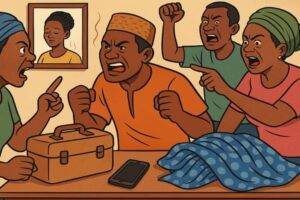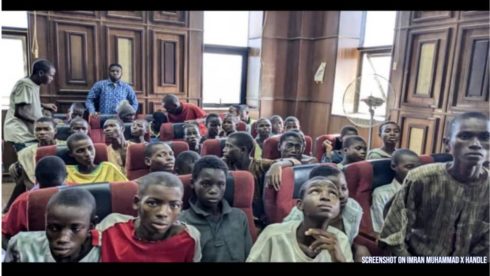The Federal Government announced its intention to release several young people detained during the EndBadGovernance protests. The children, who had allegedly flown Russian flags without understanding the implications, were arrested on suspicion of foreign collusion. After nearly a year of detention, this move signals a step toward easing political tensions and addressing human rights concerns that have plagued the country in recent years.
The protest movement, aimed at opposing corruption and Federal Government misconduct, drew considerable attention, both domestically and internationally. Despite global awareness of the protests, the arrest of these children for flying Russian flags drew criticism, as many argued they were merely expressing dissent without any intention of foreign allegiance. The government’s latest directive for their release without conditions is seen as an attempt to foster goodwill and bridge the growing trust gap between the youth and the state.
Detained for ‘Ignorance’ of Flag Implications
The children were reportedly detained for carrying Russian flags, which some officials interpreted as a sign of foreign allegiance or influence in the protest movement. However, family members and civil society advocates insist the youths did not understand the political connotations of the flags they carried, arguing they were merely using them as symbols of rebellion. Since their detention, human rights organizations have advocated tirelessly for their release, emphasizing the right to protest and the fact that carrying a foreign flag does not necessarily imply disloyalty.
Legal representatives have also highlighted that the young detainees were largely unaware of the historical and political connections the flags represented. Their defense has been grounded in the argument that symbolic gestures often do not reflect intentional actions and that children should not face punishment for symbolic choices they did not fully comprehend. This release is anticipated to relieve their families and supporters while adding momentum to ongoing conversations about human rights and civil liberties.
Unconditional Release Sparks Hope Among Activists
The unconditional release directive has been hailed by human rights advocates, who view it as a victory in the fight for social justice. For months, organizations like Amnesty International and Human Rights Watch have pushed for an immediate release of the detainees, who they argue were held unjustly. Many activists see this decision as a win for democratic expression and a step toward rectifying injustices from the protest crackdowns.
The move has inspired a renewed sense of hope among activists and supporters, who have been calling for more accountability and responsiveness from the Federal Government. Analysts believe this decision could set a precedent for other detained activists and protesters, signaling Federal Government’s willingness to reconsider some of its hardline measures against dissent.
Federal Government Aims to Mend Relations with Youth
Federal Government’s decision to release the detainees appears to be a strategic step toward mending strained relations with the youth. Following the EndBadGovernance protests, there has been a noticeable increase in distrust between young citizens and Federal Government officials. This release could mark an important step in healing those divisions and rebuilding a relationship of mutual understanding and respect.
In a statement, Federal Government spokesperson emphasized the administration’s commitment to reform, stating that the release reflects their dedication to the rule of law and the importance of addressing citizens’ concerns. This move could lay the groundwork for future dialogue between Federal Government and young activists, signaling an openness to reforming policies that have previously led to public unrest.
Critics Warn Against Empty Gestures
While many hail the move, critics caution that the release could be seen as an empty gesture if it is not accompanied by deeper reforms. Some political analysts argue that the decision, though welcomed, does not fully address the underlying causes of the protests or the broader issues of Federal Governance that motivated the EndBadGovernance movement. They warn that without substantive changes in policy and governance, similar incidents of mass protests and discontent may arise again.
Critics also highlight that while this release may bring short-term relief, it does not necessarily signal a shift in policy regarding protest rights or freedom of expression. Civil rights leaders are urging Federal Government to take more comprehensive steps to protect protest rights and address systemic issues to avoid further crackdowns and detentions.
A Step Toward Political Stability or Temporary Peace?
The release of the detained youths may contribute to a more stable political climate, but questions remain about whether it represents a genuine move toward long-term peace. As the country grapples with the challenges of Federal Governance reform, youth disenfranchisement, and economic instability, some wonder if this measure will be enough to satisfy public calls for accountability and change.
Observers argue that while this decision could ease immediate tensions, Federal Government may need to adopt additional strategies for fostering trust, especially with the children population. Addressing structural issues behind the unrest will likely be crucial to ensuring that this release is more than a temporary solution and that lasting peace and stability can be achieved in the long term.
Table of Contents
Discover more from OGM News NG
Subscribe to get the latest posts sent to your email.














